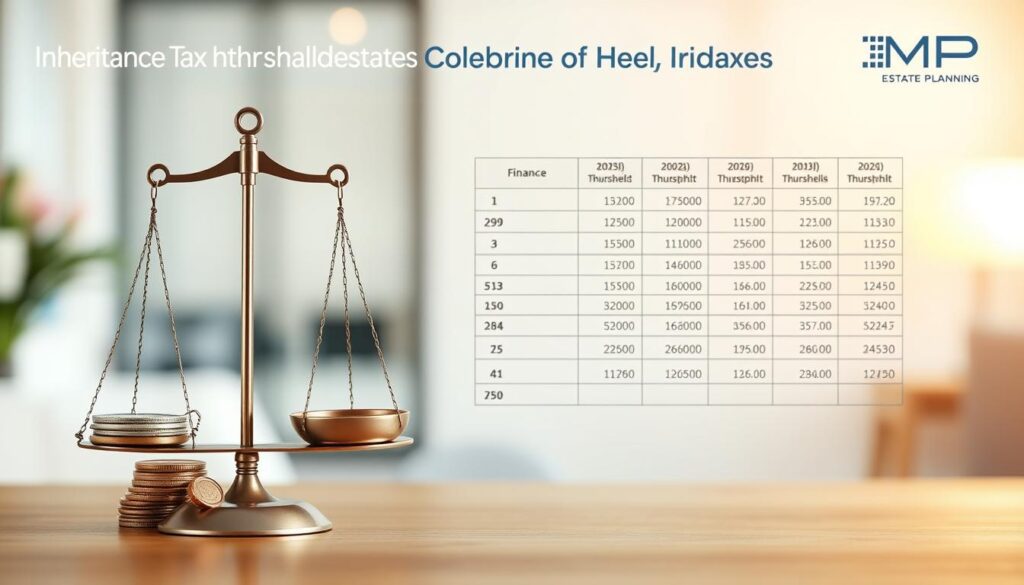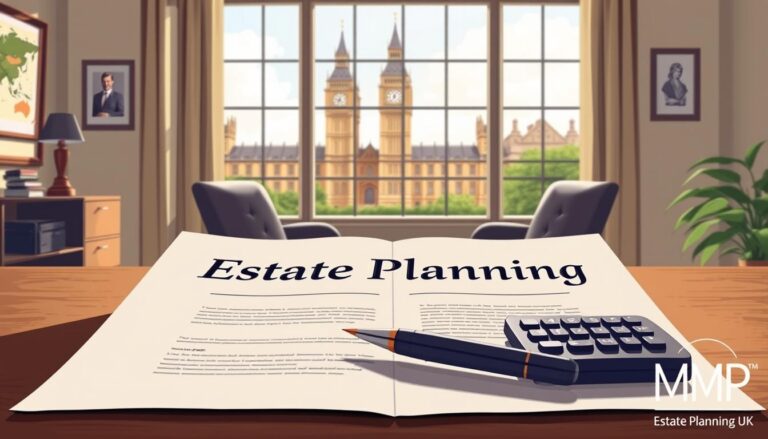When a loved one passes away, dealing with their estate can be a daunting task. Did you know that in the UK, over 500,000 people apply for probate every year? This process involves obtaining the legal authority to manage the deceased’s assets, and it’s crucial to understand whether you need probate or not.
We are here to guide you through this complex process. The need for probate largely depends on the value of the assets and how they are held. For instance, if the deceased held assets jointly with someone else, probate might not be necessary. However, if the assets are held solely in their name, probate is usually required to access these assets.
In this article, we will explore the small estates threshold for probate UK and how it affects the need for probate. Understanding the probate threshold UK is vital for managing the estate efficiently.
Key Takeaways
- Probate is the legal authority to deal with someone’s estate after they die.
- The need for probate depends on the value and holding of the deceased’s assets.
- The UK has a specific threshold for small estates that affects probate requirements.
- Assets held jointly may not require probate.
- Understanding the probate threshold UK is crucial for efficient estate management.
What is Probate and Why is it Required?
Probate is a legal process that validates a will, enabling executors to distribute the deceased’s assets according to their wishes. This process is crucial in ensuring that the estate is managed and distributed fairly and legally.
Defining Probate
Probate is essentially the process by which a court validates a will. It confirms that the will is genuine and gives the executor the legal authority to manage and distribute the deceased’s estate. Probate rules for small estates in the UK can simplify this process, making it less daunting for those involved.
The Role of an Executor
An executor is a person appointed by the deceased to manage their estate after they pass away. Their role involves gathering in the assets, paying off debts, and distributing the remaining assets according to the will. Executors play a vital role in ensuring that the deceased’s wishes are respected.
- Gathering in the assets of the deceased
- Paying off debts and taxes
- Distributing the remaining assets according to the will
Importance of Probate in Estate Management
Probate is essential for estate management as it provides a legal framework for the distribution of assets. It ensures that the deceased’s wishes are carried out and that the estate is managed in a fair and transparent manner. Understanding probate regulations for small estates in the UK can help executors navigate this process more effectively.
Without probate, there could be disputes over the validity of the will, and the distribution of assets could be delayed or even contested in court.
Overview of Small Estates in the UK
Understanding what constitutes a small estate in the UK is crucial for navigating the probate process. In essence, a small estate refers to an estate with minimal assets or assets held jointly, which can simplify the process of estate distribution upon the deceased’s passing.
Definition of a Small Estate
A small estate is typically characterized by having assets below a certain threshold. While there isn’t a universally applied limit, financial institutions and other organizations may have their own definitions. For instance, some banks may release funds without requiring probate if the total estate value is below a specific amount, often cited as £5,000 to £50,000, though this can vary.
The definition can also depend on how assets are held. For example, assets held jointly with another person typically pass to the surviving joint owner without the need for probate. This can significantly reduce the value of the estate that is subject to probate.
Key Characteristics of Small Estates
Small estates often have certain characteristics that distinguish them from larger estates. These include:
- Low Asset Value: The total value of the assets is relatively low.
- Jointly Held Assets: A significant portion of the assets is held jointly with others.
- Simple Estate Structure: The estate’s structure is straightforward, with fewer complexities.
To illustrate the differences, consider the following table comparing small and larger estates based on certain characteristics:
| Characteristics | Small Estates | Larger Estates |
|---|---|---|
| Asset Value | Typically below £50,000 | Often exceeds £100,000 |
| Asset Distribution | Often held jointly or distributed through other means | More complex distribution, including multiple beneficiaries |
| Probate Requirement | May not require probate due to low asset value or joint ownership | Usually requires probate to ensure legal distribution |

It’s essential for executors and beneficiaries to understand these characteristics to navigate the probate process efficiently. By recognizing whether an estate is considered small and understanding its key features, individuals can better manage the estate’s administration.
Small Estates Threshold for Probate in 2025
As we approach 2025, understanding the small estates threshold for probate in the UK becomes increasingly important for executors and beneficiaries alike. The threshold determines whether probate is required for an estate, and it varies significantly among different banks and financial institutions.
Current Threshold
The current threshold for probate in the UK is not uniform and can range between £5,000 and £50,000, depending on the bank or financial institution holding the assets. This variability means that executors must check with each bank to determine the specific threshold that applies.
| Bank/Financial Institution | Threshold Amount |
|---|---|
| Bank of England | £5,000 |
| HSBC | £10,000 |
| Barclays | £15,000 |
| NatWest | £50,000 |
Changes Expected in 2025
While there are no confirmed changes to the probate threshold for 2025, it’s essential for executors to stay informed about potential updates. Any changes could impact whether probate is required for small estates.
“The landscape of probate thresholds is constantly evolving, and executors must remain vigilant to ensure compliance with the latest regulations.”
Factors Influencing the Threshold
Several factors can influence the probate threshold, including economic conditions, legislative changes, and banking policies. Executors should be aware of these factors to navigate the probate process effectively.
- Economic conditions
- Legislative changes
- Banking policies
For instance, during times of economic uncertainty, banks may lower their thresholds to reduce risk. Similarly, changes in legislation can directly impact the probate threshold.

Understanding these dynamics is crucial for managing small estates efficiently. Executors should consult with financial advisors and legal professionals to stay abreast of any changes.
How to Determine if an Estate is Small
The process of determining if an estate is small involves several key factors that we will explore in detail. To make an informed decision, executors must understand both the value of the assets within the estate and any liabilities or debts that may be present.
Assessing the Value of Assets
To assess whether an estate is small, we first need to determine the total value of its assets. This includes:
- Cash and savings
- Properties, including the main residence and any other real estate
- Investments, such as stocks, bonds, and other securities
- Personal belongings, including vehicles, jewelry, and other valuables
For a comprehensive understanding, it’s crucial to value these assets accurately. For instance, property values can be determined using current market valuations, while investments can be valued based on their current market price.
| Asset Type | Valuation Method | Example |
|---|---|---|
| Cash and Savings | Current Balance | £10,000 |
| Properties | Market Valuation | £250,000 |
| Investments | Market Price | £50,000 |
Understanding Liabilities and Debts
Alongside assessing the value of assets, understanding the estate’s liabilities and debts is vital. This includes:
- Mortgages and secured loans
- Unsecured debts, such as credit card debt and personal loans
- Funeral expenses and other outstanding bills
- Any taxes owed, including Inheritance Tax
By subtracting the total liabilities from the total asset value, we can determine the net value of the estate. This figure is crucial in deciding whether the estate is considered small and if probate is required.

For executors, understanding these elements is key to navigating the probate process efficiently. By accurately assessing the estate’s value and understanding its liabilities, we can determine the appropriate steps to take, ensuring compliance with UK laws and regulations regarding probate fees for small estates in the UK.
Process of Applying for Probate for Small Estates
Understanding the probate application process is crucial for executors managing small estates. The process involves several steps that must be followed carefully to ensure a smooth and efficient experience.
Step-by-Step Guide for Executors
Executors play a vital role in managing the estate of the deceased. Here’s a step-by-step guide to help them through the probate application process:
- Gather necessary documents: Collect all relevant documents, including the will, death certificate, and details of the estate’s assets and liabilities.
- Assess the estate’s value: Determine the total value of the estate to confirm it qualifies as a small estate under UK probate rules.
- Complete the probate application form: Fill out the appropriate form, usually the PA1P or PA1A, depending on whether there’s a will or not.
- Submit the application: Send the completed form to the HM Courts & Tribunals Service, along with the required fee and supporting documents.
Required Documentation
The following documents are typically required for a probate application:
- The original will (if there is one)
- Death certificate
- Details of the estate’s assets, including property, bank accounts, and investments
- Information about any debts or liabilities
- Identification for the executors, such as passports or driving licenses
Timeframes for Application
The timeframe for processing a probate application can vary. Typically, it takes between 6 to 8 weeks for the probate registry to process the application. However, this can be affected by factors such as the complexity of the estate and the workload of the probate registry.
To avoid delays, it’s essential to ensure that all required documentation is submitted correctly and that the application form is filled out accurately.
Differences Between Small and Large Estates
When it comes to estate management, the size of the estate significantly influences the legal and financial procedures involved. Understanding these differences is crucial for executors and beneficiaries to navigate the probate process efficiently.
Legal Procedures
The legal procedures for small and large estates differ significantly. For small estates, the process is often streamlined, with fewer legal formalities required. In contrast, large estates involve more complex legal procedures, including detailed valuations of assets and potentially lengthy court proceedings.
For instance, small estates might not require a full probate application, whereas large estates typically do. This distinction is critical because it affects the paperwork, legal fees, and overall time required to administer the estate.
Financial Implications
The financial implications of probate also vary between small and large estates. Large estates often face higher inheritance tax liabilities, which can significantly reduce the value of the estate passed to beneficiaries. In contrast, small estates may be entirely exempt from inheritance tax or have a much lower tax burden.
Executors of large estates must carefully consider the tax implications and potentially seek professional advice to minimize tax liabilities. For small estates, the financial implications are generally less severe, allowing for a more straightforward distribution of assets.

Time Efficiency
Time efficiency is another area where small and large estates differ. Small estates typically take less time to administer due to simpler legal procedures and fewer assets to distribute. Large estates, however, can take several months or even years to resolve due to their complexity and the detailed valuations required.
| Estate Size | Legal Procedures | Financial Implications | Time Efficiency |
|---|---|---|---|
| Small Estates | Streamlined process, fewer legal formalities | Lower or no inheritance tax | Less time-consuming, typically a few weeks to a few months |
| Large Estates | Complex legal procedures, detailed valuations | Higher inheritance tax liabilities | More time-consuming, potentially several months to years |
For more information on securing your family’s future in the UK through effective estate planning, visit our guide on inheritance tax.
Common Myths about Small Estates and Probate
Clarifying common myths about small estates and probate can help executors navigate their responsibilities more effectively. Many people have misconceptions about what constitutes a small estate and the probate process, which can lead to confusion and unnecessary complications.
Misconceptions Debunked
One common myth is that small estates are exempt from probate. While it’s true that estates below a certain threshold may not require probate, the specifics depend on the assets involved and their value. For instance, if an estate includes property held in joint tenancy or assets in trust, probate may not be necessary. However, this isn’t always the case, and each estate must be evaluated individually.
Another misconception is that probate is a lengthy and costly process. While probate can be complex, simplifying the process for small estates can make it more manageable. Understanding the small estates probate limit UK and the probate exemption limit UK can help executors anticipate what to expect.
| Myth | Reality |
|---|---|
| All small estates are exempt from probate. | Exemption depends on the assets and their value. |
| Probate is always lengthy and costly. | The complexity and cost vary based on the estate’s specifics. |
Clarifying Legal Rights and Responsibilities
Executors have a fiduciary duty to manage the estate according to the deceased’s wishes as outlined in their will, or according to the law if there is no will. Understanding their legal rights and responsibilities is crucial for navigating the probate process effectively. For more information on managing estate taxes, executors can refer to resources on inheritance tax planning.
It’s also important for executors to be aware of the potential tax implications of the estate. While small estates may have a lower tax burden, understanding the thresholds and available reliefs can help minimize tax liabilities.

Tax Implications for Small Estates
The tax implications for small estates can be complex, and understanding them is vital for effective estate management. Executors must navigate various tax regulations to ensure compliance and minimize tax liabilities.
Inheritance Tax Thresholds
In the UK, inheritance tax (IHT) is a significant consideration for estates. The current IHT threshold, also known as the nil-rate band, is £325,000. If the estate’s value exceeds this threshold, IHT is applicable at a rate of 40% on the amount above the threshold. However, there are certain exemptions and reliefs available that can reduce the IHT liability.
For instance, the residence nil-rate band (RNRB) is an additional allowance of up to £175,000 (as of 2023-2024) that applies when a residence is passed to direct descendants. This can significantly reduce the IHT payable. It’s also worth noting that gifts made during a person’s lifetime can impact the estate’s IHT liability, and understanding these rules is crucial for effective tax planning.
Tax Reliefs Available
Several tax reliefs are available that can reduce the tax burden on small estates. These include:
- Business Relief: Reduces the value of business assets by 100% or 50%, depending on the type of business.
- Agricultural Relief: Reduces the value of agricultural property by 100%.
- Charitable Donations: Donations to registered charities can reduce IHT liability.
Understanding these reliefs and how they apply to the estate is crucial for minimizing tax liabilities.
To illustrate the potential tax implications and reliefs, consider the following example:
| Estate Value | IHT Liability | With RNRB | With Business Relief |
|---|---|---|---|
| £400,000 | £30,000 (40% of £75,000) | £0 (if RNRB applies) | £0 (if Business Relief applies) |
| £500,000 | £70,000 (40% of £175,000) | £30,000 (with RNRB) | £0 (if Business Relief applies) |

By understanding the tax implications and available reliefs, executors can better manage the estate’s tax liabilities, ensuring that beneficiaries receive their inheritances with minimal deductions.
Resources for Executors of Small Estates
Executors of small estates in the UK have various resources available to help them navigate the probate process. These resources are designed to provide guidance and support, ensuring that executors can manage the estate effectively and in accordance with UK probate regulations.
Government Websites and Guidance
The UK government provides several resources that can aid executors in managing small estates. These include:
- Official government websites that offer detailed guidance on the probate process, including forms and application procedures.
- Clear explanations of probate rules for small estates in the UK and how they apply to different situations.
- Information on Inheritance Tax thresholds and how they impact small estates.
Professional Help: Solicitors and Accountants
In addition to government resources, executors can also seek professional help from solicitors and accountants who specialize in probate and estate management. These professionals can provide:
- Expert advice on navigating the complexities of probate law and ensuring compliance with UK regulations.
- Assistance with preparing and submitting the necessary documentation for probate applications.
- Guidance on managing the financial aspects of the estate, including tax implications and distributions to beneficiaries.
By leveraging these resources, executors of small estates can ensure that they are well-equipped to handle their responsibilities and manage the estate in the best possible way.
Conclusion: Making Informed Decisions
Understanding the small estates threshold for probate UK is crucial for executors to manage the estate effectively. The probate threshold UK dictates whether an estate requires probate, and being informed helps in making the right decisions.
Estate Value and Probate
Assessing the estate’s value accurately is vital. This includes understanding the assets, liabilities, and how they impact the probate process. For guidance on how the new inheritance tax rules affect your family’s future, visit MP Estate Planning.
Seeking Professional Help
Executors should not hesitate to seek professional help when needed. Solicitors and accountants can provide valuable assistance in navigating the complexities of probate and ensuring compliance with UK laws. Understanding the probate threshold UK and seeking help when necessary can simplify the process and reduce stress.


